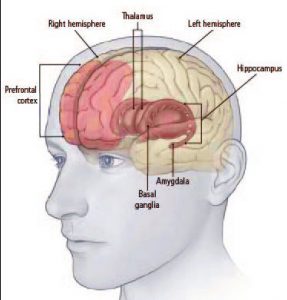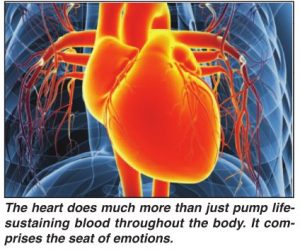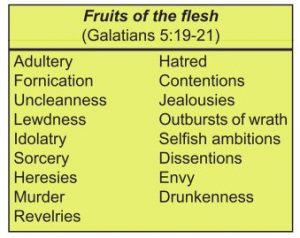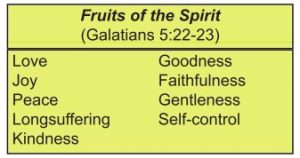
The Plain Truth About Depression
We Don’t Enjoy It, But Does It Serve a Divine Purpose?
Being depressed is not very pleasant, and according to modern psychology is a state of mind that ought to be avoided. This state of being is not at all uplifting in terms of its effects on the mind and body and certainly is not tied to vigorous, abundant healthful living as the Creator wishes for us (John 10:10; II John 2).
We all experience depression in one form or another, some times more than at other times, and we normally cycle through these times of feeling low to periods of feeling optimistic and bright. David, a man well acquainted with depression, made this clear when he said,
“Sing praise to the Lord, you saints of His, and give thanks at the remembrance of His holy name. For His anger is but for a moment; His favor is for life; weeping may endure for a night, but joy comes in the morning” (Psalm 30:4-5).
Anxiety and depression oftentimes go hand-in-hand, and according to the Anxiety and Depression Association of America, about 40 million adults in the U.S. age 18 and older suffer these debilities every year. That is about 18% of the population! Major depression (MDD), so severe that a person is disabled and cannot function well, affects over 16 million Americans from ages 15 to 44 each year while persistent depression disorders (PDD) affect another 3.3 million U.S. adults.1
What is Depression?
The exact mechanisms of depression are complex and interrelated. Causes include faulty mood regulation by the brain, genetic vulnerability, stressful events, drugs, and various health issues. Within the brain, there tends to be a reduction in chemicals called neurotransmitters, which enable communication amongst nerve cells (neurons). Neurotransmitters include the following;2
Acetylcholine enhances memory and is involved in learning and recall.
Serotonin helps regulate sleep, appetite, and mood, and inhibits pain. Research supports the idea that some depressed people have reduced serotonin transmission. Low levels of a serotonin byproduct have been linked to a higher risk for suicide.
Norepinephrine constricts blood vessels, raising blood pressure. It may trigger anxiety and be involved in some types of depression. It also seems to help determine motivation and reward.
Dopamine is essential to movement. It also influences motivation and plays a role in how a person perceives reality. Problems in dopamine transmission have been associated with psychosis, a severe form of distorted thinking characterized by hallucinations or delusions. It is also involved in the brain’s reward system, so it is thought to play a role in substance abuse.
Glutamate is a small molecule believed to act as an excitatory neurotransmitter and to play a role in bipolar disorder and schizophrenia. Lithium carbonate, a well-known mood stabilizer used to treat bipolar disorder, helps prevent damage to neurons in the brains of rats exposed to high levels of glutamate. Other animal research suggests that lithium might stabilize glutamate reuptake, a mechanism that may explain how the drug smooths out the highs of mania and the lows of depression in the long term.
Gamma-aminobutyric acid (GABA) is an amino acid that researchers believe acts as an inhibitory neurotransmitter. It is thought to help quell anxiety.
The parts of the brain known to be affected by depression are these three.3
Amygdala: The amygdala is part of the limbic system, a group of structures deep in the brain that is associated with emotions such as anger, pleasure, sorrow, fear, and sexual arousal. The amygdala is activated when a person recalls emotionally charged memories, such as a frightening situation. Activity in the amygdala is higher when a person is sad or clinically depressed. This increased activity continues even after recovery from depression.

Thalamus: The thalamus receives most sensory information and relays it to the appropriate part of the cerebral cortex, which directs high-level functions such as speech, behavioral reactions, movement, thinking, and learning. Some research suggests that bipolar disorder may result from problems in the thalamus, which helps link sensory input to pleasant and unpleasant feelings.
Hippocampus: The hippocampus is part of the limbic system and has a central role in processing long-term memory and recollection. The interplay between the hippocampus and the amygdala might account for the adage “once bitten, twice shy.” It is this part of the brain that registers fear when you are confronted by a barking, aggressive dog, and the memory of such an experience may make you wary of dogs you come across later in life. The hippocampus is smaller in some depressed people, and research suggests that ongoing exposure to stress hormones impairs the growth of nerve cells in this part of the brain.
The body’s system works like this.4 “If you trained a high-powered microscope on a slice of brain tissue, you might be able to see a loosely braided network of neurons that send and receive messages. Each neuron has a cell body containing the structures that any cell needs to thrive. Stretching out from the cell body are short, branchlike fibers called dendrites and one longer, more prominent fiber called the axon.
“A combination of electrical and chemical signals allows communication within and between neurons. When a neuron becomes activated, it passes an electrical signal from the cell body down the axon to its end (known as the axon terminal), where chemical messengers called neurotransmitters are stored. The signal releases certain neurotransmitters into the space between that neuron and the dendrite of a neighboring neuron. That space is called a synapse. As the concentration of a neurotransmitter rises in the synapse, neurotransmitter molecules begin to bind with receptors embedded in the membranes of the two neurons.
“The release of a neurotransmitter from one neuron can activate or inhibit a second neuron. If the signal is activating, or excitatory, the message continues to pass farther along that particular neural pathway. If it is inhibitory, the signal will be suppressed. The neurotransmitter also affects the neuron that released it. Once the first neuron has released a certain amount of the chemical, a feedback mechanism (controlled by that neuron’s receptors) instructs the neuron to stop pumping out the neurotransmitter and start bringing it back into the cell. This process is called reabsorption or reuptake. Enzymes break down the remaining neurotransmitter molecules into small particles.
“Brain cells usually produce levels of neurotransmitters that keep senses, learning, movements, and moods perking along. But in some people who are severely depressed or manic, the complex systems that accomplish this go awry. For example, receptors may be oversensitive or insensitive to a specific neurotransmitter, causing their response to its release to be excessive or inadequate. Or a message might be weakened if the originating cell pumps out too little of a neurotransmitter or if over-efficient reuptake mops up too much before the molecules have the chance to bind to the receptors on other neurons. Any of these system faults could significantly affect mood.”
In short, negative moods or other factors such as genetics, stress, drugs, or illness, reduce the levels of neurotransmitters, which affect neuron function and bring on depression. Let us look a bit closer at each of these causes.
(a) Negative emotions. Fear, anger, jealousy, pride, and other negative emotions, when nurtured over a period of time, will cause disruptions in the nervous system’s normal operations and reduce the levels of neurotransmitters, bringing on depression.
(b) Genetic predisposition. Since our DNA is contained in every one of our 10 trillion cells, and everyone’s DNA differs from everyone else’s and is unique, it is understandable that the genetics of certain families can affect the susceptibility to depression. Some mental disorders tend to run in families, but we also need to be aware that families tend to pass along dietary, exercise, and behavior habits that directly influence one’s proclivity towards depression and other mental problems.
(c) Stress. Stress is an automatic physical response to any stimulus that requires you to adjust. This threat may be either real or imagined. “When a physical or emotional threat looms, the hypothalamus secretes corticotropin-releasing hormone (CRH), which has the job of rousing your body. CRH follows a pathway to your pituitary gland, where it stimulates the secretion of adrenocorticotropic hormone (ACTH), which pulses into your bloodstream. When ACTH reaches your adrenal glands, it prompts the release of cortisol. The boost in cortisol readies your body to fight or flee. Your heart beats faster — up to five times as quickly as normal — and your blood pressure rises. Your breath quickens as your body takes in extra oxygen. Sharpened senses, such as sight and hearing, make you more alert.
“CRH also affects the cerebral cortex, part of the amygdala, and the brainstem. It is thought to play a major role in coordinating your thoughts and behaviors, emotional reactions, and involuntary responses. Working along with a variety of neural pathways, it influences the concentration of neurotransmitters throughout the brain. Disturbances in hormonal systems, therefore, may well affect neurotransmitters, and vice versa. Normally, a feedback loop allows the body to turn off “fight-or-flight” defenses when the threat passes. In some cases, though, the floodgates never close properly, and cortisol levels rise too often or simply stay high. This can contribute to problems such as high blood pressure, immune suppression, asthma, and possibly depression.”5
(d) Drugs and medical problems. Drugs of various sorts can lead to depression by interfering with neurotransmitter levels, and hormones that direct their production. An underactive thyroid gland can lead to exhaustion and depression, while heart disease, multiple sclerosis, Parkinson’s disease, Alzheimer’s disease, stroke, nutritional deficiencies (especially vitamin B12), lupus, and other immune system problems, cancer, and viruses can lead to depression.
The Scriptures and the Heart

We must not minimize the importance of the heart in our emotions, for Scripture indicates it is also a major source of feelings and contributes to depression. The word heart is used 877 times in the King James Version, oftentimes to express much more than just the vital organ that pumps blood to every cell of our body. Notice the meaning of the Hebrew word for heart — leb — as explained by John Kohlenberger.
“The heart [when used as a noun] includes not only the motives, feelings, affections, and desires, but also the will, the aims, the principles, the thoughts, and the intellect of man. In fact, it embraces the whole inner man, the head never, being regarded as the seat of intelligence. While it is the source of all action and the center of all thought and feeling, the heart is also described as receptive to the influences both from the outer world and from God Himself. Leb means heart; mind; midst. It is used of God and man.”6
As the seat of emotions (Deuteronomy 6:5; Exodus 4:14), the heart can be merry (Judges 16:25), fearful (Isaiah 35:4), or trembling (I Samuel 4:13), but also is regarded as …
(1) the seat of knowledge and wisdom (Deuteronomy 29:4; I Kings 3:9).
(2) an organ of memory (Job 22:32).
(3) the center of conscience and moral character (Job 27:6; II Samuel 24:10).
(4) the fountain of man’s deeds (Genesis 20:5; I Kings 3:6; Isaiah 38:3).
(5) a source of rebellion and pride (Genesis 8:21; Ezekiel 28:2).
Moreover, Scripture indicates that God controls the heart by giving a person a new one (Ezekiel 36:26), creating a clean one (Psalm 51:10), causing a believer’s heart to fear His Name (Psalm 86:11), and He tries the heart (I Chronicles 29:17).
The heart represents the inner being of a person, the man himself, and is the fountain of all he does (Proverbs 4:4). “All his thoughts, desires, words, and actions flow from deep within him. Yet, a man cannot understand his own heart” (Jeremiah 17:9).
In the Greek, kardia is the word translated as, heart in the New Testament, and means much the same as leb in Hebrew. It essentially is used to represent man’s entire mental and moral activity, including both his rational and emotional elements. Kardia can mean the following.
(1) The hidden springs of personal life
(2) The seat of depravity, the center of man’s inner life that defiles what he does (Matthew 15:19-20)
(3) The sphere of Divine influence, the “hidden” or “real” person (Romans 2:15; Acts 15:9; I Peter 3:4)
(4) The seat of moral nature and spiritual life, of grief (John 14:1; Romans 9:2), joy (John 16:2), desires (2 Peter 2:14), affections (Luke 24:32), perceptions (John 12:40), thoughts (Hebrews 4:12), understanding (Matthew 13:15, reasoning powers (Luke 24:38), imagination (Luke 1:51), conscience (Acts 2:37), intentions (Hebrews 4:12), purpose in life (2 Corinthians 9:7), will (Romans 6:17), and faith (Mark 11:23; Hebrews 3:12).
Truly, the heart has perhaps more to do with our emotions, thoughts, and walk through life than the brain. It has been proven that memories are stored in cells and organs throughout the body — somewhat akin to the memory of certain compounds imprinted in water in homeopathy7 — a fact that has taken on special life from the stories of organ transplant recipients. Here are two such stories.8
“One of the more famous cases includes a woman named Clair Sylvia. In the, 70’s this woman received a heart and lung transplant from an 18-year-old boy who died in a motorcycle accident. After her surgery, Sylvia had cravings she never had before like beer and burgers. After some time, she contacted the family of her donor and was in shock that he enjoyed the same foods. She wrote a book on her experiences entitled A Change of Heart: A Memoir.9
“Another extreme case was an 8-year-old girl who received a 10-year-old girl’s heart. After her operation, she began to have nightmares of a man trying to kill her. Her dreams were so vivid that she went to a psychiatrist who actually believed they were real. It was found that the donor was murdered, and the recipient who had the nightmares described the man in such detail that the police were able to find the killer, and he was convicted of murder.”
The Scriptures Tell Us Much
Now that we know a bit about what causes depression, let us examine the word of God to see if we can find any examples of God’s people experiencing such a condition. There are indeed several examples, including some of the most famous Biblical characters.
David. How could a man after God’s own heart (I Samuel 13:14) be afflicted with depression at times? Such a reality is repeated frequently in the Psalms. Here are three such instances.
“Turn Yourself to me, and have mercy on me, for I am desolate and afflicted. The troubles of my heart have enlarged; bring me out of my distresses! Look on my affliction and my pain, and forgive all my sins. Consider my enemies, for they are many, and they hate me with cruel hatred “ (Psalm 25:16-19).
“O Lord, do not rebuke me in Your wrath, nor chasten me in Your hot displeasure! For Your arrows pierce me deeply, and Your hand presses me down. There is no soundness in my flesh because of Your anger, nor any health in my bones because of my sin. For my iniquities have gone over my head; like a heavy burden, they are too heavy for me. My wounds are foul and festering because of my foolishness. I am troubled, I am bowed down greatly; I go mourning all the day long. For my loins are full of inflammation, and there is no soundness in my flesh. I am feeble and severely broken; I groan because of the turmoil of my heart… for I am ready to fall, and my sorrow is continually before me. For I will declare my iniquity; I will be in anguish over my sin. (Psalm 38: 1-8, 17-18).
“I cry out to the Lord with my voice; with my voice to the Lord I make my supplication. I pour out my complaint before Him; I declare before Him my trouble. When my spirit was overwhelmed within me, then You knew my path. In the way in which I walk they have secretly set a snare for me. Look on my right hand and see, for there is no one who acknowledges me; refuge has failed me; no one cares for my soul. I cried out to You, O Lord; I said, ‘You are my refuge, My portion in the land of the living. Attend to my cry, for I am brought very low; deliver me from my persecutors, for they are stronger than I. Bring my soul out of prison, that I may praise Your name; the Righteous shall surround me, for You shall deal bountifully with me’” (Psalm 142:1-7)

Jonah. This prophet of God tried to escape the mission the Eternal had sent him on to Nineveh, but the big fish swallowed him and transported him to his destination, where his preaching led to widespread repentance of the people, and God’s failure to destroy the city. This change of God’s heart greatly depressed Jonah.
“Then God saw their works, that they turned from their evil way; and God relented from the disaster that He had said He would bring upon them, and He did not do it. But it displeased Jonah exceedingly, and he became angry. So he prayed to the Lord, and said, ‘Ah, Lord, was not this what I said when I was still in my country? Therefore I fled previously to Tarshish; for I know that You are a gracious and merciful God, slow to anger and abundant in lovingkindness, One who relents from doing harm. Therefore now, O Lord, please take my life from me, for it is better for me to die than to live!’ …. And it happed, when the sun arose, that God prepared a vehement east wind; and the sun beat on Jonah’s head so that he grew faint. Then he wished death for himself, and said, ‘It is better for me to die than to live.’ Then God said to Jonah, ‘Is it right for you to be angry about the plant?’ And he said,’It is right for me to be angry, even to death!’” (John 3:10; 4:1-3, 8-9).

Job. Job was a very rich man in terms of livestock and other wealth, with a beautiful family as well. This was all taken away in short order through the wiles of Satan, and this broken man lamented the very day he was born.
“After this Job opened his mouth and cursed the day of his birth. And Job spoke, and said; ‘May the day perish on which I was born, and the night in which it was said, ‘A male child is conceived.’ May that day be darkness; may God above not seek it, nor the light shine upon it. May darkness and the shadow of death claim it; may a cloud settle on it; may the blackness of the day terrify it. As for that night, may darkness seize it; may it not rejoice among the days of the year, may it not come into the number of the months…. Why did I not die at birth? Why did I not perish when I came from the womb? Why did the knees receive me? Or why the breasts, that I should nurse? For now I would have lain still and been quiet, I would have been asleep; then I would have been at reast…. Why is light given to him who is in misery, and life to the bitter of soul, who long for death, but it does not come, and search for it more than hidden treasures; who rejoice exceedingly, and are glad when they can find the grave?’” (Job 3:1-6, 11-13, 20-22).
Elijah. Fleeing from Jezebel after the priests of Baal were killed at Mount Carmel, Elijah sought relief under a broom tree where he lamented his fate.
“And Ahab told Jezebel all that Elijah had done, also how he had executed all the prophets with the sword. Then Jezebel sent a messenger to Elijah, saying, ‘So let the gods to me, and more also if I do not make your life as the life of one of them by tomorrow about this time.’ And when he saw that, he arose and ran for his life, and went to Beersheba, which belongs to Judah, and left his servant there. But he himself went a day’s journey into the wilderness, and came and sat down under a broom tree. And he prayed that he might die, and said, ‘It is enough! Now, Lord, take my life, for I am no better than my fathers!’” (I Kings 19:1-4).
Jeremiah. Sent as a prophet to proclaim a message of doom for more than 40 years to Judah because of their sins, Jeremiah through a flood of tears pleaded with his countrymen to turn from their wicked ways. He was indeed a man deeply afflicted with sorrow and trouble.
“Your ways and your doings have procured these things for you. This is your wickedness, because it is bitter because it reaches to your heart. O my soul, my soul! I am pained in my very heart! My heart makes a noise in me; I cannot hold my peace, because you have heard, O my soul, the sound of the trumpet, the alarm of war” (Jeremiah 4:18-19).
“Therefore you shall say this word to them: ‘Let my eyes flow with tears night and day, and let them not cease; for the virgin daughter of my people has been broken with a mighty stroke, with a very severe blow’” (Jeremiah 14:17).
Moses. This patriarch of Israel was many times pushed to the limit by his fellow sojourners, having to plead with Yahweh three times to prevent Him from annihilating these rebels. He was even driven to such frustration that he asked God to kill him.
“Then Moses heard the people weeping throughout their families, everyone at the door of his tent; and the anger of the Lord was greatly aroused; Moses also was displeased. So Moses said to the Lord, ‘Why have You afflicted Your servant? And why have I not found favor in Your sight, that You have laid the burden of all these people on me? Did I conceive all these people? Did I beget them, that You should say to me, “Carry them in your bosom, as a guardian carried a nursing child,” to the land which You swore to their fathers? Where am I to go get meat to give to all these people? For they weep all over me, saying, “Give us meat, that we may eat.” I am not able to bear all these people alone, because the burden is too heavy for me. If you treat me like this, please kill me here and now — if I have found favor in Your sight — and do not let me see my wretchedness!’” (Numbers 11:10-15).
Other examples of patriarchs and prophets who were oppressed and depressed can be found in Scripture, not the least of which is the suffering of Jesus Christ on the night of His crucifixion when He asked if the Father would somehow take away the suffering He was about to endure (Mark 14:36). That same hour he sweated as it were “great drops of blood” (Luke 22:44), showing the agony He was enduring, the stress that His human body had to endure in order for Him to prepare the way for our salvation through His suffering.
The Issue of Depression — from God’s Words
It is apparent from our Creator’s words that an anxious and depressed state is not just a matter of mind; it is an issue of the heart, the seat of emotions … for while both rational thought and emotional responses work together to generate our attitudes, it is our emotional response to issues of life — our innermost attitudes — that grant us our feelings that lead to depression. This points directly to the fruit of the spirit which, live within us, those of the world or those of our Creator.
There is no law against the fruit of God’s spirit (Galatians 5:23), meaning these attitudes come from God Himself, and are inherent in the spirit given to a person at baptism and the laying on of hands … the manifestation of the very character of Jesus Christ as He amplified the commandments by showing us how these laws are intended to be kept — not just in the letter, but with broken and contrite hearts (Psalm 34:18; 51:17).
“Do not think that I came to destroy the Law or the Prophets. I did not come to destroy but to fulfill. For assuredly, I say to you, till heaven and earth pass away, one jot or one tittle will by no means pass from the law till all is fulfilled.”
Jesus Christ came to “magnify [gadal, ‘to be large’] the law and make it honorable” [adar, “to expand, be great or magnificent”] (Isaiah 42:21).
 We see now that depression oftentimes finds its roots in living according to the fruits of the flesh. We also should note that depression can result from rejection by others, even as Jesus Christ was rejected by the leaders of His day and suffered greatly as a result. The same is true for us Christians today, who are rejected by this world’s culture (John 15:18-19).
We see now that depression oftentimes finds its roots in living according to the fruits of the flesh. We also should note that depression can result from rejection by others, even as Jesus Christ was rejected by the leaders of His day and suffered greatly as a result. The same is true for us Christians today, who are rejected by this world’s culture (John 15:18-19).
The Christian understands that his future holds incredible rewards in the government that the Father and Christ will establish on earth (Acts 3:19-21), as he lives in the assurance that not only will he become eternal sinless spirit, but will reign as a king and priest on earth to rebuild it to Edenic fulness during the millennium (Revelation 5:10; 20:4). None of us can fully comprehend how great a future lies on ahead as spirit sons of Elohim, reigning with Jesus Christ, except through the words of the Word Himself! “Eye has not seen, nor ear heard, nor have entered into the heart of man the things which God has prepared for those who love Him” (Isaiah 64:4; 65:17; I Corinthians 2:9). We can visualize some of those truths concerning our future as spirits in the heavenly realm, those that the Father wishes to reveal to us (I Corinthians 2:10).
 Thus we see the hope imparted through the spirit of God for an incredible future that cannot be taken away, which hope is part and parcel with the fruits of the spirit living within us.
Thus we see the hope imparted through the spirit of God for an incredible future that cannot be taken away, which hope is part and parcel with the fruits of the spirit living within us.
It is no wonder that so many people in the world today live in hopeless desperation, not knowing what the future might bring, and as a result, lapse into depression and anxiety. This result is the opposite of how we are told to think.

“Rejoice in the Lord always. Again I will say, rejoice! Let your gentleness be known to all men. The Lord is at hand. Be anxious for nothing, but in everything by prayer and supplication, with thanksgiving, let your requests be made known to God; and the peace of God, which surpasses all understanding, will guard your hearts and minds through Christ Jesus. Finally, brethren, whatever things are true, whatever things are noble, whatever things are just, whatever things are pure, whatever things are lovely, whatever things are of good report, if there is any virtue and if there is anything praiseworthy — meditate on these things” ( Philippians 4:4-8).
Depression … a Good Thing!
Could it be that our human tendency toward hopelessness and depression is actually very good in God’s scheme of things? Let us take a close look at what Scripture teaches about this very important matter that affects all of us.
1. Depression leads to humility, the quality that is super-critical in being close to our Creator. Note the words of Yahweh Himself.
 “But on this one will I look, on him who is poor and of a contrite spirit, and who trembles at My word” (Isaiah 66:2).
“But on this one will I look, on him who is poor and of a contrite spirit, and who trembles at My word” (Isaiah 66:2).
“The Lord is near to those who have a broken heart, and saves such as have a contrite spirit (Psalm 34:18).
“For You do not desire sacrifice, or else I would give it; You do not delight in burnt offerings. The sacrifices of God are a broken spirit, a broken and a contrite heart — these, O God, You will not despise” (Psalm 51:16-17).
Being “lowly of heart” is the opposite of pride. This humility is essential for each of us and is the nature of our Father in heaven and of Christ. Notice in particular Matthew 11:28-29.
“Come to Me, all you who labor and are heavy laden, and I will give you rest. Take My yoke upon you and learn from Me, for I am gentle and lowly in heart, and you will find rest for your souls, for My yoke is easy and My burden is light” (Matthew 11:28-30).
lowly = tapeinos, “depressed, figuratively humiliated; that which is low and does not rise far from the ground; of no degree.” This word is translated as follows in the King James Version: “of low degree” (Luke 1:52; James 1:9), “humble” (James 4:6; I Peter 5:5), “base (2 Corinthians 10:1), “cast down” (2 Corinthians 7:6), “of low estate” (Romans 12:16).
What is apparent here is that Jesus Christ, the Creator of this world (John 1:3; Colossians 1:16), does not think of Himself as being great or high in stature, but rather of low estate, as He showed Himself when He rode into Jerusalem as King, on a young donkey (Luke 19:35-37). Talk about humility, displayed by the coming King over all the earth! Moreover, recall that He washed the feet of all 12 disciples the night He was betrayed, showing He did not consider Himself to be superior even to these men, who all ended up deserting Him (John 13:2-16); rather, He reversed the traditional roles of lord and teacher, to kneel on the ground and wash their feet as a servant would … for indeed that is the message He was trying to portray, just as Paul said in Philippians 2:3 and 5, “… but in lowliness of mind let each esteem others better than himself… Let this mind be in you which was also in Christ Jesus.”
We must be humble as our heavenly Father and Jesus Christ are humble, not considering ourselves of any repute, not being lifted up in pride and self-centeredness, but rather we must take on the character of our Elder Brother as stated above in Matthew 11:28-30. Being”lowly” is akin to being depressed, not vaunting the self, understanding the reality of oneself, and not trying to make yourself into someone you are not. Jesus Christ was the epitome of that quality, the I AM, the self-existent One who is exactly what He says He is. We also must strive to be exactly what God has made us, to be.
2. Depression and its unpleasant effects on the mind and the body force us to examine ourselves and change — repent — from the sins which have caused the condition in the first place. For most of us, we coast along day-to-day without changing, captured by the habits we have become accustomed to … but that rut may include some unsavory habits that are driving us and those around us into the ground. Perhaps we are ungrateful for our family and friends who help support us, have a drinking problem, are quick to anger rather than patient and forbearing, are negligent with our finances, or take for granted the incredible calling we have been given and have become complacent.
Repentance is, of course, the focus of our Christian walk. It is the first arrow in the quiver of us all, for as Peter said at Pentecost, “Repent, and be baptized every one of you in the name of Jesus Christ for the remission of sins, and you shall receive the gift of the holy spirit” (Acts 2:38)
Repent is the Greek word metanoeo, “to perceive afterwards (meta, meaning after, implying change; noeo, meaning to perceive, versus pronoeo, to perceive beforehand”); literally, to change one’s mind.”
We all came out of a world wherein sin (lawlessness) predominates, and when we received the gift of the holy spirit the law was written in our hearts (Jeremiah 31:33; Hebrews 8:10). That law in its spiritual intent oftentimes conflicts with the habit patterns of our carnal nature, so our inner being had to be reprogrammed to the Eternal’s pattern. Such a change does not happen overnight … “because the carnal mind is enmity against God, for it is not subject to the law of God, nor indeed can be” (Romans 8:7).
David stated,
“Who can understand his errors? Cleanse me from secret faults. Keep back your servant also from presumptuous sins; let them not have dominion over me” (Psalm 19:12-13).
secret = cathar, “to conceal, hide, or shelter.” These secret faults are the hardest of our sins to root out, as the word in its several contexts throughout Scripture indicate
l Cain was hidden from God’s presence, implying a separation (Genesis 4:14).
l To hid oneself (cathar) is to take refuge (I Samuel 23:19).
l Cathar, can mean to shelter oneself from one’s enemies (Jeremiah 36:26).
l By hiding (cathar) God’s face from our sins is asking Him to ignore them (Psalm 51:9).
l Cathar can mean withdrawing God’s favor, as from Judah (Isaiah 8:17).
presumptuous = zade, “arrogant; from zuwd, “to seethe and be insolent.”
Our concealed sins are the most difficult to detect, but we all have them. We must ask God to reveal them to us, for they can easily lead to depression for which we have no explanation. This has been so true for me personally, since habit patterns passed down from my parents sometimes led to behaviors that resulted in a depressed state of mind. God has revealed these hidden errors over time, for which I am very grateful.
 The really good news is that once repentance occurs, the weight is lifted and the depressed spirit is removed. We are not speaking of possession by an evil spirit, which can produce depression, such as when Saul was removed from being king over Israel and “… a distressing spirit from the Lord troubled him” (I Samuel 16:14). With baptism and receiving the spirit of God with the laying on of hands, any evil spirits cannot abide within the mind and heart of the new convert; good and evil cannot coexist: “For what fellowship has righteousness with lawlessness? And what communion has light with darkness?” (2 Corinthians 6:14).
The really good news is that once repentance occurs, the weight is lifted and the depressed spirit is removed. We are not speaking of possession by an evil spirit, which can produce depression, such as when Saul was removed from being king over Israel and “… a distressing spirit from the Lord troubled him” (I Samuel 16:14). With baptism and receiving the spirit of God with the laying on of hands, any evil spirits cannot abide within the mind and heart of the new convert; good and evil cannot coexist: “For what fellowship has righteousness with lawlessness? And what communion has light with darkness?” (2 Corinthians 6:14).
The Cure for Depression
“As the bird by wandering, as the swallow by flying, the curse causeless shall not come” (Proverbs 26:2).
Cause and effect.
Depression is an alert system for some underlying problems over which we have considerable control. The medical and psychiatric professions have an array of solutions they profess to manage depression — they can seldom cure it, and that is not usually their objective — which includes the following.10
(1) Drugs. The first action a medical or psychiatric physician will take is to prescribe drugs. These could include serotonin reuptake inhibitors, bupropin, mirtazapine, tricyclic antidepressants, monoamine oxidase inhibitors, and others. They all have side effects, including tremors, hallucinations, cancer, and suicide. None of them treat the causes of depression.
(2) Psychotherapy. Talking about the condition can help a person adjust to a crisis and encourage positive thoughts, as well as encourage positive relationships with others, set realistic goals, and accept distress for what it is.
(3) Electroconvulsive therapy. This involves passing an electric current through the brain to impart neurotransmitters. As archaic and brutal as it is, the therapy is still used today.
(4) Transcranial magnetic stimulation. A coil is placed against the scalp which sends brief magnetic pulses to stimulate nerve cells.
None of these treatments involve diet, nutritional changes, or other natural means. None of them are directed at the cause of the depression.
What then does God’s word say about treating anxiety and depression? We have already alluded to several approaches, but let us first recall that the patriarch David was afflicted with virtually all of the symptoms of depression. These included crying (several Psalms; II Samuel 12:22), a loss of interest in usual activities (2 Samuel 11:1), attempts to maintain relationships with people that harmed him (I Samuel 18 and 19), attempts to console and enable his abuser Saul (I Samuel 18 and 24), seeking the thrill of what is forbidden (2 Samuel 11), pleasure-seeking (2 Samuel 5:13; I Chronicles 3), expressing hopelessness (several Psalms), a lack of appetite and weight loss (Psalm 102:5), and frequent insomnia (Psalm 22:2).
In spite of all these human reactions, David was a man after God’s own heart (Acts 13:22), which shows that he knew the way to deal with such a condition. What are these ways that our Creator reveals?
(1) Practice good health habits. Follow the laws of clean and unclean meats (Leviticus 11), fresh and unprocessed, unpolluted foods (Exodus 20:15), plenty of rest, positive friendships with brethren (Acts 2:42; Romans 12;10), exposure to fresh air and sunlight, avoidance of accidents, and regular exercise (I Timothy 4:7).
 (2) Make the resurrection and your future in the Kingdom of God a profound reality. There is no better way to remove hopelessness and discouragement from your life than to understand how wonderful that future new Eden will be (I Corinthians 2:9-10; Acts 3:19-21), and your part as a king and a priest in it (Revelation 5:10). Recall that without vision the people perish (Proverbs 29:18).
(2) Make the resurrection and your future in the Kingdom of God a profound reality. There is no better way to remove hopelessness and discouragement from your life than to understand how wonderful that future new Eden will be (I Corinthians 2:9-10; Acts 3:19-21), and your part as a king and a priest in it (Revelation 5:10). Recall that without vision the people perish (Proverbs 29:18).
(3) Recognize that an anxious and depressed state of mind and heart are signals for you to examine yourself and see how you may be conflicting with God’s laws. Remember that a broken spirit is to God a sacrifice, not a curse (Psalm 51:17), designed to make us repent and draw closer to our Creator.
(4) Work. Keep working, at both your servile and spiritual work! Never give up, but keep moving forward with patience (Hebrews 12:1), but run so as to win the race (I Corinthians 9:24). It is God’s desire that we work with our hands to give to those who have a need, (Ephesians 4:28), and that it is the diligent people at their work that bear rule and are noticed (Proverbs 12:24). By doing whatever you do with your might (Ecclesiastes 9:10), and by throwing yourself into your work, you automatically take your thoughts away from yourself and find worth and fulfillment in your achievements.
(5) Gain encouragement through fellowship with brethren. Fellowship is so very critical in keeping our hearts and minds focused on what is really important, helping us avoid the “woe is me” discouragement habit of thinking. I enjoy the words of Ronald Dart in an article he wrote about the holy spirit and the encouragement it gives to us brethren.11 Of course, our fellowship with one another has the same effect.
“Why does Jesus refer to the Holy Spirit as a ‘Comforter’? The Greek word is parakletos. I stumbled onto something interesting about the root of this word in a curious passage in 2 Corinthians: ‘Blessed be God, even the Father of our Lord Jesus Christ, the Father of mercies, and the God of all comfort: Who comforteth us in all our tribulation, that we may be able to comfort them which are in any trouble, by the comfort wherewith we ourselves are comforted of God. For as the sufferings of Christ abound in us, so our consolation also aboundeth by Christ. And whether we be afflicted, it is for your consolation and salvation. And our hope of you is steadfast, knowing, that as ye are partakers of the sufferings, so shall ye be also of the consolation’ (2 Corinthians 1:3-7 KJV).
“In five short verses, Paul uses the same Greek root ten times, making a deliberate play on words.
“The Greek root is parakaleo, the verb, and is expressed as paraklesis, in noun or adjective construction. It is translated in the KJV as ‘comfort’ and ‘consolation,’ and years ago I ran a word study through all uses throughout the New Testament. There are nearly 140 instances of the words in the New Testament. As I ran the study, it slowly dawned on me that, in modern terms, comfort and consolation don’t quite say what Paul and others intended to say. The best renderings of the root were the English words ‘encourage’ and ‘encouragement’ and for the Holy Spirit, ‘Encourager’.
“And out of this comes one of the most important things to know about the Holy Spirit — it is an encourager, not a discourager. Those who are led by the Spirit encourage, they do not discourage. I believe we need to be more sensitive and more responsive to the work of the Holy Spirit in our lives.”
In Conclusion …
The apostle Paul made clear the thoughts we need to focus upon in our daily living to avoid falling prey to discouraging thought patterns. Watching or listening to newscasts can easily demoralize a person — as much as we need to keep in touch with world events — and perhaps in the days of Paul there was plenty to become discouraged about as well. Here is what he said, and this is what we need to think about.
“Rejoice in the Lord always, Again I will say, rejoice! Let your gentleness be known to all men. The Lord is at hand. Be anxious for nothing, but in everything by prayer and supplication, with thanksgiving, let your requests be made known to God; and the peace of God, which surpasses all understanding, will guard your hearts and minds through Christ Jesus. Finally, brethren, whatever things are true, whatever things are noble, whatever things are just, whatever things are pure, whatever things are lovely, whatever things are of good report, if there is any virtue and if there is anything praiseworthy — meditate on these things” (Philippians 4:4-8).
Bibliography
1. Anonymous, Facts, and statistics about ADAA, Anxiety, and Depression Association of America, www.adaa.org.
2. Anonymous, What causes depression, Harvard Health Publishing, Harvard Medical School, Harvard University, Cambridge, Massachusetts, June 24, 2019, www.harvard.edu.
3. See 2.
4. See 2.
5. See 2.
6. J. Kohlenberger, III, in The New Strong’s Expanded Exhaustive Concordance of the Bible, Thomas Nelson, Nashville, Tennessee, 2001.
7. D. Ullman, Discovering Homeopathy, Medicine for the 21st Century, North Atlantic Books, Berkeley, California, 1988.
8. G. Absi, Is the brain the only place that stores our memories, Boston University Undergraduate Program, Boston, Massachusetts, November 11, 2014, www.sites.bu.edu.
9. C. Sylvia, A Change of Heart: A Memoir, Warner Books, New York, 1997.
10. Anonymous, Depression (major depressive disorder), Mayo Clinic, Rochester, Minnesota, www.mayoclinic.org.
11. R. Dart, borntowin.org.

